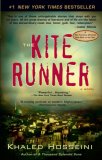Summary | Excerpt | Reading Guide | Reviews | Readalikes | Genres & Themes | Author Bio

They called him "flat-nosed" because of Ali and Hassan’s characteristic Hazara Mongoloid features. For years, that was all I knew about the Hazaras, that they were Mogul descendants, and that they looked a little like Chinese people. School textbooks barely mentioned them and referred to their ancestry only in passing. Then one day, I was in Baba’s study, looking through his stuff, when I found one of my mother’s old history books. It was written by an Iranian named Khorami. I blew the dust off it, sneaked it into bed with me that night, and was stunned to find an entire chapter on Hazara history. An entire chapter dedicated to Hassan’s people! In it, I read that my people, the Pashtuns, had persecuted and oppressed the Hazaras. It said the Hazaras had tried to rise against the Pashtuns in the nineteenth century, but the Pashtuns had "quelled them with unspeakable violence." The book said that my people had killed the Hazaras, driven them from their lands, burned their homes, and sold their women. The book said part of the reason Pashtuns had oppressed the Hazaras was that Pashtuns were Sunni Muslims, while Hazaras were Shi’a. The book said a lot of things I didn’t know, things my teachers hadn’t mentioned. Things Baba hadn’t mentioned either. It also said some things I did know, like that people called Hazaras mice-eating, flat-nosed, load-carrying donkeys. I had heard some of the kids in the neighborhood yell those names to Hassan.
The following week, after class, I showed the book to my teacher and pointed to the chapter on the Hazaras. He skimmed through a couple of pages, snickered, handed the book back. "That’s the one thing Shi’a people do well," he said, picking up his papers, "passing themselves as martyrs." He wrinkled his nose when he said the word Shi’a, like it was some kind of disease.
But despite sharing ethnic heritage and family blood, Sanaubar joined the neighborhood kids in taunting Ali. I have heard that she made no secret of her disdain for his appearance.
"This is a husband?" she would sneer. "I have seen old donkeys better suited to be a husband."
In the end, most people suspected the marriage had been an arrangement of sorts between Ali and his uncle, Sanaubar’s father. They said Ali had married his cousin to help restore some honor to his uncle’s blemished name, even though Ali, who had been orphaned at the age of five, had no worldly possessions or inheritance to speak of.
Ali never retaliated against any of his tormentors, I suppose partly because he could never catch them with that twisted leg dragging behind him. But mostly because Ali was immune to the insults of his assailants; he had found his joy, his antidote, the moment Sanaubar had given birth to Hassan. It had been a simple enough affair. No obstetricians, no anesthesiologists, no fancy monitoring devices. Just Sanaubar lying on a stained, naked mattress with Ali and a midwife helping her. She hadn’t needed much help at all, because, even in birth, Hassan was true to his nature: He was incapable of hurting anyone. A few grunts, a couple of pushes, and out came Hassan. Out he came smiling.
As confided to a neighbor’s servant by the garrulous midwife, who had then in turn told anyone who would listen, Sanaubar had taken one glance at the baby in Ali’s arms, seen the cleft lip, and barked a bitter laughter.
"There," she had said. "Now you have your own idiot child to do all your smiling for you!" She had refused to even hold Hassan, and just five days later, she was gone.
Baba hired the same nursing woman who had fed me to nurse Hassan. Ali told us she was a blue-eyed Hazara woman from Bamiyan, the city of the giant Buddha statues. "What a sweet singing voice she had," he used to say to us.
What did she sing, Hassan and I always asked, though we already knew—Ali had told us countless times. We just wanted to hear Ali sing.
From The Kite Runner by Khaled Hosseini, copyright © 2003 Khaled Hosseini, published by G. P. Putnam's Sons, a member of Penguin Group (USA) Inc., all rights reserved, reprinted with permission from the publisher.
A classic is a book that has never finished saying what it has to say
Click Here to find out who said this, as well as discovering other famous literary quotes!
Your guide toexceptional books
BookBrowse seeks out and recommends the best in contemporary fiction and nonfiction—books that not only engage and entertain but also deepen our understanding of ourselves and the world around us.